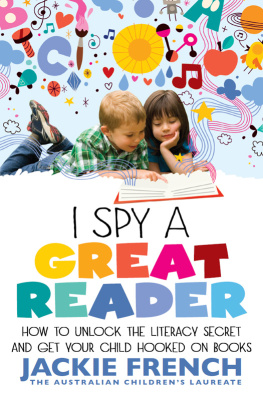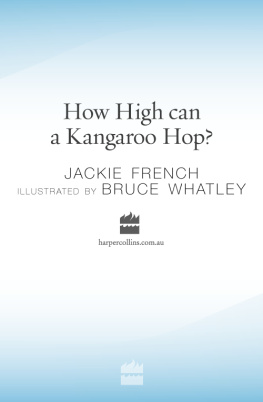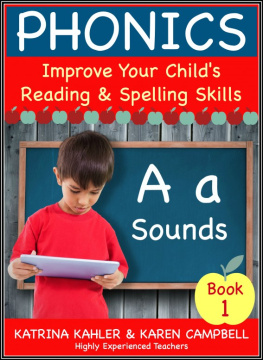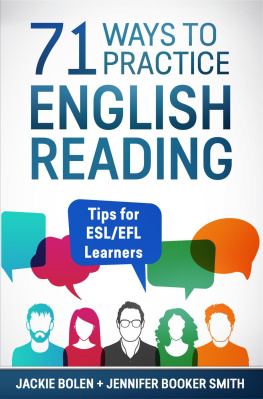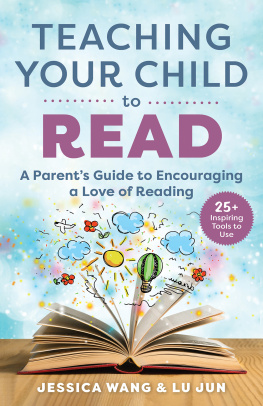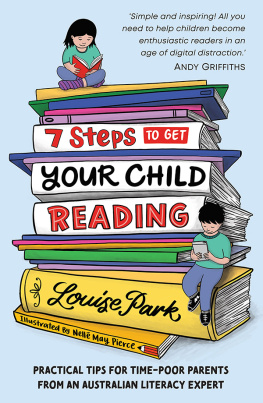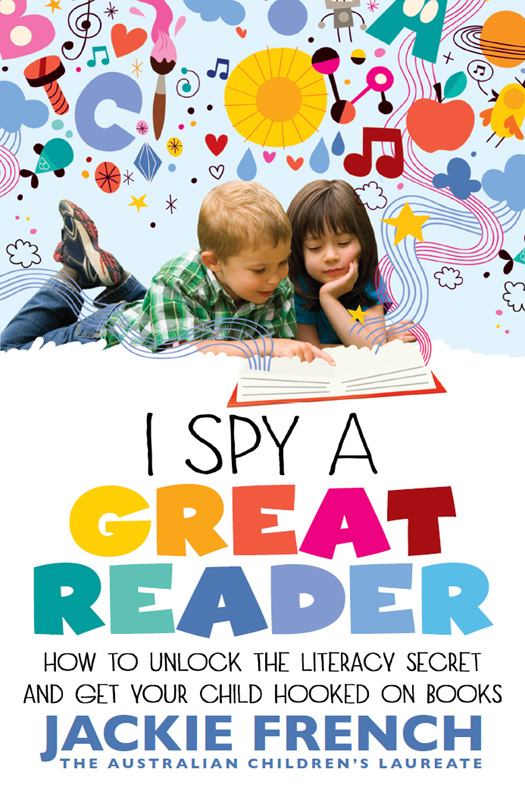CONTENTS
Every child can learn to read.
Every child must learn to read.
Reading makes kids more intelligent. It doesnt just make them seem more intelligent: reading creates new neural connections in a childs brain by stimulating the growth of new neurons as they imagine the world the writer has put on paper.
TV, movies and electronic games dont do this they spoon-feed their worlds to a child. But every universe a child reads about is created by him or her in partnership with the writer.
If you want your kids to be more intelligent, give them books.
If you want them to learn empathy, to understand how others feel, give them books, because stories give kids this too.
Every book they read shows children how others feel or see the world. Nothing nothing! can equal this.
Reading is the most vital skill we learn at school.
Reading doesnt just give you knowledge. It gives you the tools to use knowledge. Once there were many jobs that meant you could get by without knowing how to read. These days online material is a vital part of modern social and administrative life. A child who cant read is deeply excluded from our society.
And reading means you are part of the world of books. A book is a small, transportable, delightful universe you can keep in your handbag, glovebox or desk drawer, and take out to vanish into when the world is not as you would like it to be.
But about one in ten Australian kids cant read well enough to work their way through a simple book suited to their age. Worse: few of them get professional help. How could we let this happen?
There are many reasons a child may not learn to read, but there are no excuses. None.
Some kids fall behind in their first year of school, sometimes because they have a problem with hearing how words sound or with visually tracking them on the page. Other kids may need to be taught in different ways: outdoors rather than in the classroom, or where they can talk about what they learn with their friends.
Often the problem isnt noticed in the first or even second year at school. Dyslexic kids are often very bright indeed. Shell ask her best friend what the book says or hell find other ways to cover up his embarrassment. But the longer the problem is ignored or unnoticed, the more they have to catch up.
All too often, the problem is picked up, but shrugged off. Kids learn at different rates, a parent will be told. Dont worry, theyll catch up. And indeed some do but many dont. And they wont not unless someone steps in to help.
Even today, many teachers assume that kids with problems cant be taught. Last year I sat in a school staffroom while the teachers of kids I was about to work with made comments such as, Theyre hopeless. I dont know why we bother. Every kid I met in this hopeless group was intelligent and perceptive. They were not failures the school had failed them but they were convinced that they were stupid. It is so very, very easy to convince a child he or she is dumb. Once this happens the scars never truly fade.
It would be good to think that all kids will be taught to read by well-trained and committed professionals.
Every school needs a literacy teacher who can refer kids to specialists if they have a problem with tracking words on the page or in hearing distinct syllables, and who will work out the best way for that student to learn.
Every school needs to accept that if children cant read the material their peers are reading, they must have extra daily help until they can.
Every school needs teacher librarians who can guide kids to books theyll love so much theyll force themselves to read just to see what happens next.
Every teacher needs to accept that all kids can learn to read and write, and that if they havent yet they need to be taught in different ways, including by using Braille or by touch-typing for kids whose brains cant see words as patterns.
Perhaps, one day, well reach that ideal. Until then, parents and volunteers need to know how to teach kids instead. Teachers who work in schools without a literacy specialist need to know how to help and support the kids who do have reading problems.
Because everyone can read. Im dyslexic. I cant follow or even remember a city map; I get lost in car parks; cant see when a word is misspelt, nor read a form easily or follow if someone runs their finger under a line on the page. But I can read. Fast. I just dont read the way most kids are taught to. There are many, many ways to read.
Even if your child is going to sail through school with no problems, this book will help them grow into their full potential in the preschool years. The early years of a childs life are the most valuable of all in teaching both the skills that will become the basics of literacy and how to be fulfilled and open to happiness. This book will help to show the way.
MATTHEWS STORY
Matthew was a bright kid. He learnt to walk and talk earlier than other kids. He could remember every item in My Grandmothers Trunk (page 37). But in his first year at school he just couldnt pick up reading.
Dont worry, said his teacher. Kids learn at different rates. Hes just a bit slower. Thats what they said in his second and third year at school too.
In his fourth year, the school admitted there was a problem. He received one hour a week with a reading recovery teacher. It didnt help his reading. It even made the problem worse, because Matthew saw kids who he knew werent as bright as him learning to read, and he couldnt even manage to decode the few basic words on the page. All that one hour a week taught him was that he was dumb.
Matthew was given more help by untrained volunteer parents. He was pretty sure, he told me years afterwards, that back home they were laughing: That kid Matthew is ten years old, and he cant read yet.
Matthew was lucky. He changed schools when he was twelve. This new school sent him to an educational psychologist. The psychologist diagnosed a major learning problem. Matthew was in the 99.7th percentile of intelligence, but still couldnt read The cat sat on the mat. He was given a laptop computer, and coordination and tracking exercises. Within three months he had taught himself to read and write. It took another year to catch up on all the literacy lessons he had missed.
But he still thought he was dumb. He assumed hed fail the year twelve exams somehow the school had been fooled into thinking he was bright, but now everyone would know how stupid he really was. He did brilliantly. But at his first university exams he panicked again surely now the world would see that he was stupid. Once again he sailed through them. I dont know where he is now, but I suspect he is still doing brilliantly and still, deep down, those voices from his childhood are still whispering, Hey kid. Youre dumb.
Another school failed to notice a childs inability to track words along a line, so that at ten she still couldnt read. She picked up the basics of writing in one afternoon when the problem was finally diagnosed. A six-year-old boy was diagnosed with Attention Deficit Disorder, but within four months of work with an occupational therapist he had learnt how to concentrate. Like Matthew, he is now doing brilliantly too. So often kids with learning problems or who just need to learn differently are brighter than average, often enormously so.
Every kid can read. It is the duty of everyone to provide a world where they can learn, and find the books they need.
Other kids perhaps 3040 per cent can read, but by ten years old they have decided that books are boring.

